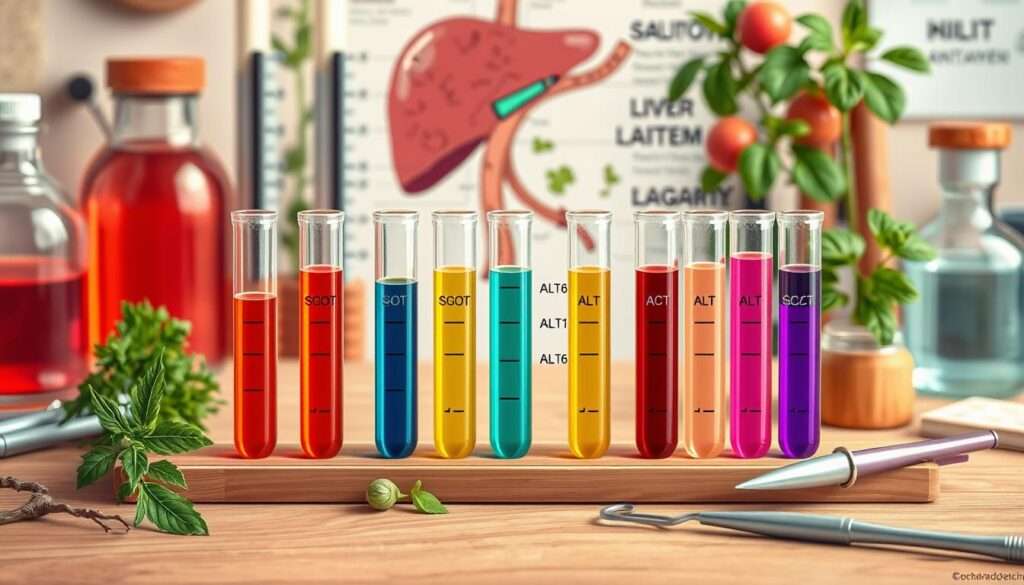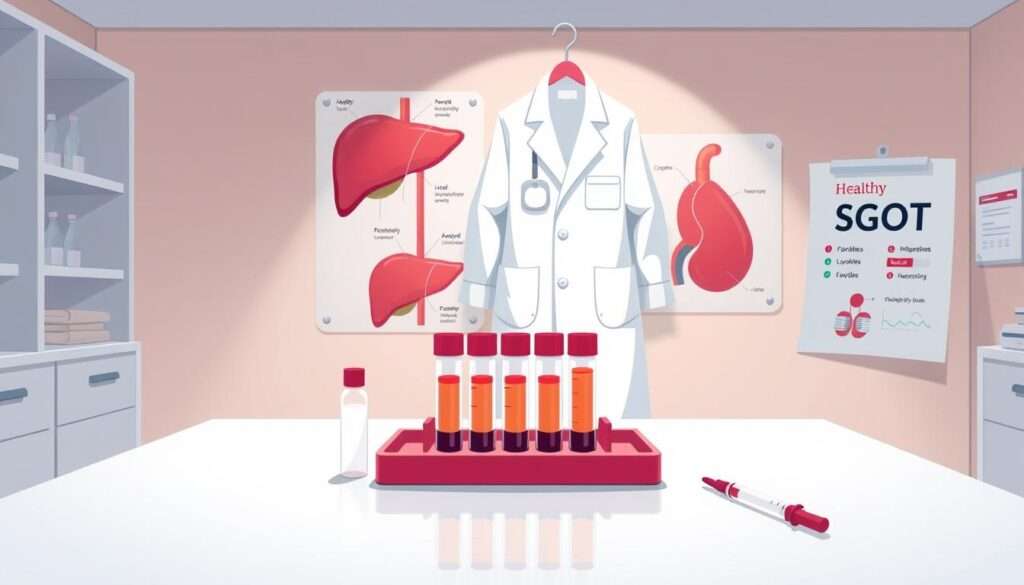Knowing about your liver health is very important. The serum glutamic oxaloacetic transaminase (SGOT) test is a key part of this. It’s also known as aspartate aminotransferase (AST).
Table of Contents
ToggleSGOT is an enzyme found mainly in the liver and other organs like the heart and muscles. By looking at your SGOT test results, Dr. Nivedita Pandey can give you important information. This helps you understand your liver’s health and spot any issues early.
This article will talk about the normal range of SGOT. We’ll also discuss what your test results mean. Plus, we’ll share tips on how to keep your liver healthy.
Understanding SGOT: The Serum Glutamic Oxaloacetic Transaminase Enzyme
SGOT, or aspartate aminotransferase (AST), is key to the liver’s work. It’s mainly in the liver but also in the heart, muscles, and kidneys. SGOT turns amino acids into energy for the body.
By checking SGOT in blood, doctors can see how well the liver is working.
Role of SGOT in Liver Function
SGOT is a liver enzyme marker. It’s mostly in liver cells. When the liver gets hurt or inflamed, SGOT gets into the blood, raising levels.
This helps doctors understand the liver’s health.
Factors Influencing SGOT Levels
Many things can change SGOT levels. Liver damage or inflammation, like from hepatitis or fatty liver, can raise it. So can muscle injury, heart attacks, and some medicines.
Knowing what affects SGOT helps doctors understand test results better.
Normal Range of SGOT: What’s Considered Healthy?
Understanding your liver health is key, and SGOT is a big part of it. SGOT, or serum glutamic oxaloacetic transaminase, has a normal range. This range can change a bit based on the lab and test methods. But usually, it’s between 10 to 40 units per liter (U/L) for. Levels in this normal sgot range are seen as healthy, normal levels.
Remember, the reference values for sgot can change a bit. This is because of age and gender, which we’ll talk about later. Keeping healthy sgot levels is key for your liver’s health. SGOT is found in many tissues, like the liver, heart, muscle, kidney, and brain.
- The normal range of AST (SGOT) is about 5 to 40 units per liter of serum.
- SGOT is normally found in various tissues, with the liver being a primary source.
- Higher-than-normal SGOT levels may indicate liver damage or injury, but not necessarily liver disease, requiring a comprehensive clinical evaluation.
It’s important to talk to your healthcare provider about your SGOT test results. They can help you understand your results in the context of your health. By knowing your normal sgot range, you can take steps to keep your healthy sgot levels. This helps support your liver’s health.

Interpreting SGOT Test Results
If your SGOT (serum glutamic-oxaloacetic transaminase) levels are high, it might mean your liver is damaged. Many health issues can cause high SGOT levels. These include viral hepatitis, fatty liver disease, and alcohol damage.
Elevated SGOT Levels and Their Implications
High SGOT levels can hint at liver problems. A doctor will need to check you to find out why. High SGOT is often linked to liver issues like:
- Viral hepatitis (including hepatitis A, B, and C)
- Non-alcoholic fatty liver disease
- Alcoholic liver disease
- Cirrhosis
Conditions Associated with High SGOT
High SGOT levels can also mean other health issues. These include:
- Muscle injuries
- Heart attacks
- Certain medications
Knowing why SGOT levels go up is key for doctors. It helps them find and treat liver or other health problems.
SGOT and Other Liver Function Tests
The SGOT test helps check your liver’s health. But, it’s often used with a bigger test that looks at more markers. This way, doctors can really understand how well your liver is working and find any problems.
The Importance of Comprehensive Liver Evaluation
A full liver test includes ALT, ALP, bilirubin, and more. This complete check is key for finding and treating liver issues right.
- ALT normal range: 7 to 55 units per liter (U/L)
- ALP normal range: 40 to 129 U/L
- Bilirubin normal range: 0.1 to 1.2 milligrams per deciliter (mg/dL)
Doctors look at all these tests together with your SGOT level. This helps them see how your liver is doing and find any issues that need attention.

It’s important to keep an eye on your liver with these tests. They help find problems early and treat them right. This way, your liver stays healthy and works well.
Normal range of SGOT: Variations by Age and Gender
SGOT levels can vary with age and gender. Men usually have higher levels than women. These levels also tend to rise as you get older.
The normal SGOT range is between 8 and 45 units per liter. For men, it’s 10 to 40 units/L. For women, it’s 9 to 32 units/L. These differences come from muscle mass, hormonal changes, and aging.
Doctors consider SGOT normal values by gender and SGOT range by age when looking at your test results. This makes sure the results fit your specific situation. It helps them understand your liver health better.
It’s key to watch your SGOT levels. Factors affecting SGOT levels like liver or heart damage can raise them. Regular tests and liver function checks can spot problems early. This helps manage your health better.
Lifestyle Factors Affecting SGOT Levels
Your lifestyle choices can greatly affect your SGOT (Serum Glutamic Oxaloacetic Transaminase) levels. SGOT is a key indicator of liver health. Knowing how diet and exercise impact SGOT helps you keep your liver healthy.
Diet and Exercise Impact on SGOT
Your diet is very important for SGOT levels. Drinking too much alcohol can raise SGOT because it harms the liver. Also, eating too much processed or high-fat food can lead to fatty liver disease, affecting SGOT.
But, regular exercise is good for SGOT levels. Activities like brisk walking, jogging, or swimming can help your liver. They also lower the risk of SGOT going up from muscle injuries or hard workouts.
- Limit alcohol to keep SGOT levels healthy
- Eat a balanced diet with lots of fruits, veggies, and lean proteins
- Make exercise a regular part of your life for liver health
By watching your lifestyle and making smart choices, you can help keep SGOT levels in check. This supports your liver’s health overall.

Monitoring SGOT Levels: When and Why
Keeping your SGOT (serum glutamic-oxaloacetic transaminase) levels healthy is key for your well-being. This liver enzyme shows how well your liver is working. Regular checks can spot health problems early.
Monitoring SGOT levels helps find liver issues early. SGOT can go up with liver damage, heart problems, muscle injuries, and some medicines. This lets doctors catch and treat problems quickly to keep your liver healthy.
Getting regular SGOT tests is a good idea, especially if you’re at risk for liver disease. This includes people who drink too much, have viral hepatitis, or fatty liver. Testing helps doctors find liver problems early, so they can treat them before they get worse.
When should you get an SGOT test? Your doctor might suggest it during routine blood tests or if you have liver symptoms. These symptoms include jaundice, belly pain, dark urine, or feeling very tired. Getting your SGOT levels checked helps keep your liver healthy and catches problems early.
The normal SGOT range is between 10 and 40 U/L of blood. If your levels are outside this range, it could mean you have a health issue. It’s important to talk to your doctor about your SGOT results and what to do next.
Preparing for an SGOT Test
To get accurate SGOT test results, follow some important steps before the blood draw. These steps help keep your SGOT levels steady. This way, your doctor can better understand your liver health.
Pre-test Instructions and Precautions
Here are key steps to take before your SGOT test:
- Fasting: You might need to fast for 8-12 hours before the blood draw. This means no food, drinks (except water), or some medicines. Always follow what your doctor tells you.
- Medication and Supplement Intake: Tell your doctor about any medicines, vitamins, or supplements you’re taking. Some can change your SGOT levels.
- Recent Medical Procedures: If you’ve had surgery or imaging tests recently, let your doctor know. These can affect your SGOT results.
- Health Status Changes: If your health has changed, like getting sick or injured, tell your doctor. These changes can also impact your SGOT levels.
By following these steps, you help make sure your SGOT test is accurate. This lets your doctor understand your liver health better.

SGOT and Liver Disease Management
If your SGOT (serum glutamic oxaloacetic transaminase) levels are high, your doctor will help find the cause. They will then create a treatment plan for you. It’s important to manage high SGOT levels to keep your liver healthy.
Treatment Options for Elevated SGOT
There are different treatments for high SGOT levels, depending on the cause. These may include:
- Medications to treat the cause, like antiviral drugs for viral hepatitis or drugs for fatty liver disease.
- Changes in your lifestyle, like eating better, moving more, and drinking less alcohol, to help with liver disease.
- Seeing a specialist, like a hepatologist, for more complex care and treatment of liver conditions.
The aim of treatment is to get your liver working right again and lower SGOT levels. This helps improve your health and well-being. By treating the cause of high SGOT, doctors can manage the condition and avoid more treatments.
Conclusion
The SGOT test is key for checking your liver’s health and how well it works. Knowing what SGOT levels should be helps you understand your test results. It also shows how to keep your liver healthy.
By knowing about SGOT, you can work with your doctors to watch your liver. This helps find problems early and treat them right away. Keeping your SGOT levels in check is important for your health and preventing liver issues.
It’s important to know about SGOT and how to keep your liver healthy. Regular tests and a healthy lifestyle are key. They help you catch and fix liver problems early.
Your liver is very important for your body’s health. Checking your SGOT levels regularly is a simple way to keep it working well. Taking care of your liver means you’re on the path to a healthier life.
FAQ
What is SGOT and what role does it play in the liver?
SGOT, or aspartate aminotransferase (AST), is an enzyme in the liver. It helps turn amino acids into energy. It shows how well the liver is working.
What factors can influence SGOT levels?
Many things can change SGOT levels. This includes liver damage, muscle injury, heart attacks, and some medicines.
What is considered a normal range for SGOT?
For adults, SGOT should be between 10 to 40 U/L. But, this can change based on the lab and test methods.
What do elevated SGOT levels indicate?
High SGOT levels might mean liver damage. This could be from viral hepatitis, fatty liver, or alcohol use.
How is SGOT evaluated alongside other liver function tests?
SGOT is checked with other liver tests like ALT, ALP, and bilirubin. This helps understand liver health better.
Are there age and gender-based variations in the normal range of SGOT?
Yes, men usually have higher SGOT levels than women. Levels also rise with age, due to muscle and hormone changes.
How can lifestyle factors affect SGOT levels?
Diet, alcohol, and exercise can change SGOT levels. They affect the liver and muscles.
When and why should SGOT levels be monitored?
It’s important to check SGOT regularly. This is especially true for people at risk of liver disease.
What should patients do to prepare for an SGOT test?
Before the test, follow certain steps. This includes fasting, avoiding certain medicines, and telling your doctor about any health changes.
How are elevated SGOT levels addressed and managed?
If SGOT is high, your doctor will find the cause. Then, they’ll create a treatment plan. This might include fixing the cause, changing your lifestyle, or seeing a specialist.
Source Links


